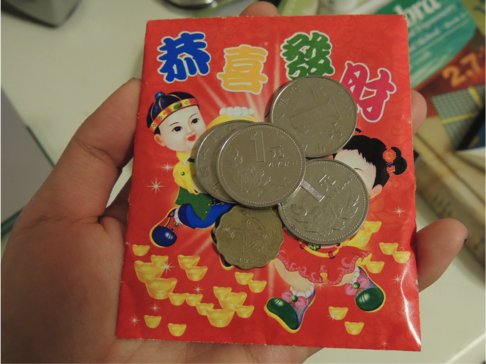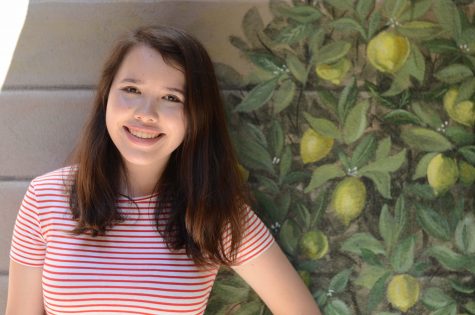Chinese New Year

Kathy Duan
The lunar calendar will transition to the year of the horse in a couple of days in the annual, two-week festival that is Chinese New Year. Although it is a holiday widely celebrated in China and the Bay Area, it has become less culturally significant for our generation through the globalization of Eastern and Western culture.
The Chinese New Year festival originated in the Shang Dynasty as a ritual to welcome the spring at the beginning of farming season. It was later changed to correspond with the lunar calendar in the Han Dynasty. Preparations start the week before the New Year, and festivities continue until two weeks later
For several of those who have grown up in the United States, Chinese New Year is just another holiday.
“We just give red envelopes,” which traditionally contain money, “to each other and eat dumplings,” says Grace Cao (10). “It’s not really about the culture; we just celebrate it to enjoy the holiday.”
But for those who have emigrated from China, the celebration takes on more importance.
“It is tradition and offers hope for better times, such as health, wealth, prosperity marriage, friends in the coming year,” said William Yuan, a Bay Area resident who moved from China in the 1980s and visits regularly. “It is the most important holiday by far.” However, he thinks that younger generations are less interested in the rituals. “Just like Christmas, it is all about gifts.”
Ray Song (9), who immigrated last summer, agreed that Chinese New Year is the most important holiday. He comments that this year is especially important “since this will be the first Chinese New Year [he will] spend without my family.”
Most students feel that generations who haven’t been in America for as long find more importance in Chinese New Year. However, they have varying opinions on whether globalization is the cause of this, and whether or not it leads to cultural traditions being forgotten. Some, like Raymond Xu (9) are optimistic.
“I speak English better than Chinese,” he says. “But I don’t think that makes me particularly Westernized. I think that as society becomes more and more globalized,” he continues, “being able to respect and honor cultural traditions makes us more integrated as a global community.”
Daniel Chiu (12) agrees with this notion.
“If you don’t preserve your culture, you’re losing your identity,” he said.
However, others, like May Gao (9), think that globalization is a one-way process.
“I feel that as globalization progresses, you begin to lose your roots,” she says. “You start celebrating more of the area’s traditions.”
Even though the holiday takes a different significance for everyone, Chinese New Year is enjoyed by all who celebrate it.
“Chinese new year is one of the few occasions during the year where you get to explore your dual identity as both Chinese and American, ” says Noel Duan (‘09), Harker alumna.

Meilan Steimle (12) is co-Editor-in-Chief of the Winged Post. She was a reporter her freshman year, Winged Post Opinion Editor her sophomore year and Winged...


















![“[Building nerf blasters] became this outlet of creativity for me that hasn't been matched by anything else. The process [of] making a build complete to your desire is such a painstakingly difficult process, but I've had to learn from [the skills needed from] soldering to proper painting. There's so many different options for everything, if you think about it, it exists. The best part is [that] if it doesn't exist, you can build it yourself," Ishaan Parate said.](https://harkeraquila.com/wp-content/uploads/2022/08/DSC_8149-900x604.jpg)




![“When I came into high school, I was ready to be a follower. But DECA was a game changer for me. It helped me overcome my fear of public speaking, and it's played such a major role in who I've become today. To be able to successfully lead a chapter of 150 students, an officer team and be one of the upperclassmen I once really admired is something I'm [really] proud of,” Anvitha Tummala ('21) said.](https://harkeraquila.com/wp-content/uploads/2021/07/Screen-Shot-2021-07-25-at-9.50.05-AM-900x594.png)







![“I think getting up in the morning and having a sense of purpose [is exciting]. I think without a certain amount of drive, life is kind of obsolete and mundane, and I think having that every single day is what makes each day unique and kind of makes life exciting,” Neymika Jain (12) said.](https://harkeraquila.com/wp-content/uploads/2017/06/Screen-Shot-2017-06-03-at-4.54.16-PM.png)








![“My slogan is ‘slow feet, don’t eat, and I’m hungry.’ You need to run fast to get where you are–you aren't going to get those championships if you aren't fast,” Angel Cervantes (12) said. “I want to do well in school on my tests and in track and win championships for my team. I live by that, [and] I can do that anywhere: in the classroom or on the field.”](https://harkeraquila.com/wp-content/uploads/2018/06/DSC5146-900x601.jpg)
![“[Volleyball has] taught me how to fall correctly, and another thing it taught is that you don’t have to be the best at something to be good at it. If you just hit the ball in a smart way, then it still scores points and you’re good at it. You could be a background player and still make a much bigger impact on the team than you would think,” Anya Gert (’20) said.](https://harkeraquila.com/wp-content/uploads/2020/06/AnnaGert_JinTuan_HoHPhotoEdited-600x900.jpeg)

![“I'm not nearly there yet, but [my confidence has] definitely been getting better since I was pretty shy and timid coming into Harker my freshman year. I know that there's a lot of people that are really confident in what they do, and I really admire them. Everyone's so driven and that has really pushed me to kind of try to find my own place in high school and be more confident,” Alyssa Huang (’20) said.](https://harkeraquila.com/wp-content/uploads/2020/06/AlyssaHuang_EmilyChen_HoHPhoto-900x749.jpeg)


